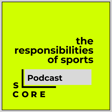
Thinking accessibility beyond mobility
Remember the last time you visited a stadium for a sports event? What was the biggest challenge that you faced in order to get there, to access your seats, to get your food, beers or soda?
Maybe the biggest challenge was to climb a mountain, cross a river or follow directions that did not exist. No? Well, 15% of the global population faces accessibility difficulties even before they reach the sports venue, it could start when they buy the tickets or from the moment they leave home to go to the venue.
This episode explores the future of accessibility of sport events and the responsibilities of International Federations and other stakeholders in improving standards. José Soares is our guest today in the new SCORE Podcast. José is the Founder & Chief Association Executive of Football for All Leadership Programme and Integrated Dreams Association.
For José, a key element to finding solutions is collaboration between Sports Federations. Avoiding reinventing the wheel and sharing best practices is the first step towards a better future of accessibility.
Additional crucial points have been shared by José: Technology and Digital Accessibility, Local Authorities’ (City) role and the awareness and importance of working beyond mobility accessibility.
Check out our website score-sport.com and our LinkedIn page, to find more information about what we do. Please rate, comment and share, if you feel like it.
This episode was recorded in September 2022.
